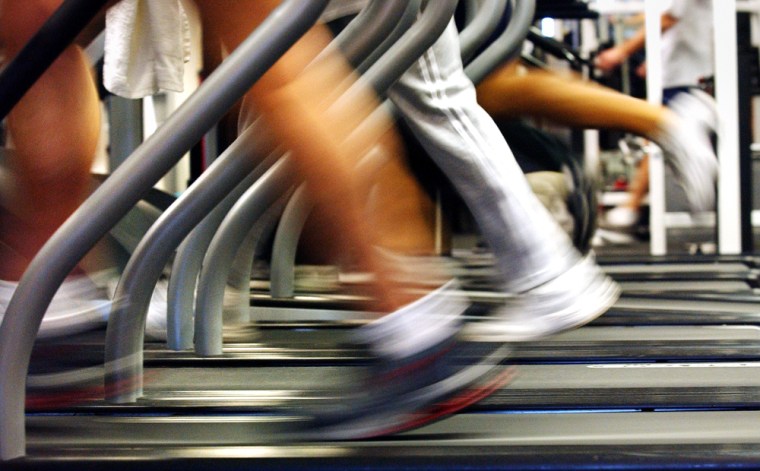Can starting a new exercise plan cause weight gain? Should smokers bother to sweat it out? Smart Fitness answers your queries. Have an exercise question? To e-mail us, . We’ll post select answers in future columns.
Q: I recently joined a gym and have been working out three to five days a week. I have changed my diet and have been eating healthful foods, but instead of losing weight I've gained almost 10 pounds! Is that to be expected when you first start an exercise program?
A: We've received this question from several readers. And the answer is no, the weight gain is not to be expected, says exercise physiologist John Ivy, head of kinesiology and health education at the University of Texas, Austin.
"This person must be eating more," Ivy says.
Sports drinks are one calorie-rich culprit that gym-goers may not be aware of, he notes. And even healthful foods like fruit juices, olive oil and whole grains can pack a hefty caloric punch if you consume too much of them.
"A lot of people don't know how many calories they're eating," says Ivy. "And what they call a portion may actually be three portions."
So don't go back to eating donuts and double cheeseburgers all day. Stick to your healthy diet; just remember to also keep track of total calories. When you consume more calories than you burn — no matter where those calories come from — you'll gain weight. And that weight is stored as fat.
There's some evidence that exercise may boost your appetite. But don't fall into the trap of thinking that because you're exercising, it's OK to take in a bunch more calories, says Molly Kimball, a sports nutritionist at Ochsner Clinic's Elmwood Fitness Center in New Orleans.
Here's an example of why that's a mistake: "An average 150-pound person will burn about 300 calories during 30 minutes of pretty intense cardiovascular exercise," Kimball says. "This 300 calories, plus much more, can easily be consumed without realizing it with something as simple as a normal-sized baked potato or sweet potato or a six-inch Subway sandwich."
So what about strength training — can't extra muscle account for added weight?
While strength training builds muscle mass, it's highly unlikely that you've gained 10 pounds of muscle in one month, says Ivy. It's just not that easy.
At most, an average person might gain up to a pound or two of muscle a month from strength training, according to Kimball.
If you continue to rapidly gain weight, see your doctor, she advises. "If something is amiss, it's always good to check with a physician to rule out any underlying issues, such as low thyroid or polycystic ovarian syndrome."
Q: I am a smoker, age 31, who recently bought a treadmill. I am not overweight (5 foot, 4 inches and 118 pounds), but I wanted to start running three to four days a week in order to kick my smoking habit. My question is this: What if I cannot quit — should I keep exercising? Is there any benefit?
A: Yes, it's better to exercise and smoke than to be a chain-smoking couch potato. Two bad habits are worse than one.
There's evidence, for example, that people who smoke and exercise regularly have lower risks of heart disease, cancer and diabetes than sedentary smokers, says Ivy.
So don't stop exercising even if you can't stop smoking.
At the same time, realize that smoking is one of the worst things you can do for your health, and it's best if you stop now.
Exercise may indeed help in that regard, according to Ivy. He says that smokers who embark on a fitness plan can become motivated to take better care of their health and stop lighting up.
Smart Fitness appears every other Tuesday.
